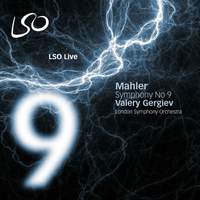Recording of the Week,
Gergiev and the LSO conclude their Mahler cycle
Knowing my love of all things Mahlerian, Chris has allowed me to take a break from my usual duties managing the sheet music side of things in order to tell you about the stunning new recording of Mahler’s Ninth Symphony from LSO Live, conducted by Valery Gergiev.
One of the highlights of Gergiev’s first full season as the LSO’s principal conductor in 2007/2008 was a complete cycle of Mahler’s symphonies. Having attended the concerts, I was delighted when I heard the news that they were to be released on disc. This newest release completes the series, although (for reasons that I shall speculate on later) this recording comes not from that initial cycle, but from later concerts in March of this year.

One of the things that always impresses me most about Gergiev is his painstaking attention to tiny issues of orchestral balance, and this is very much in evidence here, particularly in the first movement, with the opening fragmentary gestures from cellos, horn and harp giving way to the achingly beautiful violin melody, wonderfully balanced with the horn’s espressivo counterpoint. I don’t think I’ve ever heard a more touching rendition of the moment, about a third of the way into the movement, where antiphonal violins gently pass fragments of the opening material back and forth between them. The close of the movement, with its chamber music-like writing for just a few instruments, reminded me of Boulez’s Chicago recording in terms of the clarity of texture achieved, with masterful solos from the orchestra’s principal flute and horn (Gareth Davies and David Pyatt, respectively).
The second movement, a succession of Ländlers (a popular Austrian folk dance which crops up in several of Mahler’s symphonies), features delightfully witty contributions from bassoons and clarinets, with suitably rustic playing from the second violins (Mahler marks their galumphing melody to be played “like fiddles”). One of the tricky things about this movement is successfully judging the transitions between the three different tempos, and in my view Gergiev gets this just right.
Moving on to the third movement, although not quite the fastest Rondo-Burleske on record, this comes pretty close, and the savage, brutal brass in the movement’s faster sections are contrasted with the most astonishingly tender and sweet-toned trumpet solos from Philip Cobb. The conclusion is impressive, with immaculate passagework from the strings and woodwinds, and some very fine glockenspiel playing!
And so to the finale, very often the movement on which performances of this symphony falter. Perhaps the most sublime of all Mahler’s slow movements, the opening, hymn-like melody is marked molto adagio (very slow), and requires great intensity and beauty of string sound. If I sometimes have a criticism of Gergiev’s performances in general, it is that, while never less than thrilling and full of energy, he occasionally doesn’t give the music quite enough space to breathe in some of the more reflective moments. At the 2008 performance, I felt this to be especially true in this movement. Although the string chorale itself was still and measured, the subsequent bassoon motif felt rushed, and didn’t quite have the expansiveness required. Happily, Gergiev seems to have rethought his tempos since then, and I suspect that this may be one of the reasons why it was decided not to release that earlier performance on disc. The opening adagio is very slow indeed, and yet the depth and bloom of string tone is such that it never feels saggy or plodding. While still not lingering over the bassoon motif (especially when restated by the contrabassoon a few moments later), Gergiev allows time for the music to unfold, and doesn’t drive through the phrases as I felt he did in the earlier performance. The very end of the symphony, as it dies away to nothing, is deeply affecting, with the LSO strings excelling themselves in the hushed tones they bring to the final pages.
So, as you may have noticed from my somewhat effusive tone, I was truly impressed by this performance. Even if you already have several recordings of the symphony, I thoroughly recommend this one, and I hope that it moves you as much as it moved me!
London Symphony Orchestra, Valery Gergiev
Available Formats: SACD, MP3, FLAC, Hi-Res FLAC



